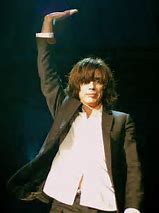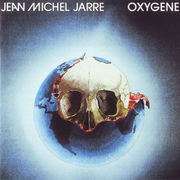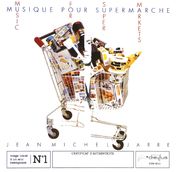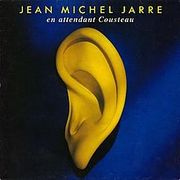User:RabidBaby
Jean-Michel Jarre is a French man (not a woman called Jean or Michelle) from Lyon in France. He is the son of famous film soundtrack writer Maurice Jarre and resistance fighter Francette Pejot - one of which his father and the other his mother. Jean-Michel Jarre is famous for owning and playing every model of synthesiser that has ever been created, resulting in 50 years of synth-based experiments. Jarre is one of the first people to be allowed in to, and back out of, China after playing music. He also builds and plays with lasers.
History[edit | edit source]
The Beginnings[edit | edit source]
As a young man, Jarre earned money by painting peoples houses and exhibiting some of his works at the Lyon Gallery, and by playing in a band called The Dustbins, such named because they were quite rubbish. "Nous sommes des ordures" said Jarre at the time. Hearing this cacophony his mother arranged for him to take lessons in harmony, counterpoint and fugue with Jeannine Rough of the Conservatoire de Paris and so he learnt piano. More experimentation followed in 1968, when he began to use concrete to make music with a builder called Peter Schaeffer-Penn but it all ultimately proved too heavy for him.
1970s[edit | edit source]
In his kitchen, with minimum equipment, Jarre made an album originally titled 'Breathing' about people suffocating and commissioned a painting by a local artist of a dead person's skull inside the planet Earth on the cover. Unfortunately Kate Bush also released a song called "Breathing" about people dying ten years later so he was not able to use the name.
Jarre's mother advised he should instead give every song the same name of Oxygené he thought this was bonkers but did what his mother advised. He had no synthesisers at the time so he used an old organ with lots of effects peddles and noise from an out of tune radio to make each song. Jarre was not able to get a record contract as the album had no singing, no guitars and all the songs had the same name, which confused everyone. One of Peter Schaeffer-Penn's other students a bricklayer called Hélène Dreyfus, persuaded her husband to publish the album. No one bought it despite the BBC in England playing the entire album in one go as they thought it was one very long song.
Unperturbed Jarre released essentially the same album again but this time he played less and got a sequencer to do all the work. He decided to also call the new album Oxygené as it sounded no different to the first. His mother explained that this would cause even more confusion so it should instead be called Equinoxygéné, again every song had the same name so the confusion was not avoided. He chose the same local artist for the album cover but this time painting an audience looking at the stage as he so far had not experienced this.
To promote both albums Jarre played an outdoor concert near the Arc de Triomphe as no venue would host him. No one turned up (this would recur throughout out his life) except a few tourists who were already there, some pigeons and a few bricklayers Dreyfus had brought along. Jarre was later quoted as saying "I think it's because I'm French, there is no singing and the songs all have the same name".
1980-1984[edit | edit source]
The next album Les Chants Magnétiques, which in French is a very humorous title and in English not at all, was released using the brand new Searchlight CMI (Completely Mad Instrument) synthesiser. Unfortunately, Jarre couldn't get the tempo set on the Completely Mad Instrument so the first song was at double speed and went on for a good 18 minutes filling the whole of the first side of the vinyl LP as it could not be switched off.
Yet again every song was given the same name. Later when Jarre got control of the CMI the track was re-released at the correct speed and renamed Overture. The album's release coincided with a tour of China. Jarre, sick of no one attending his live shows had agreed with the Chinese Communist Party's leaders that they would force people to attend. Millions of Chinese saw the concerts, no one clapped or smiled. A double album of the concerts in China was released titled Concerts in China it was a completely instrumental album that was in Chinese.
Realising that a captive audience was the way forward Jarre's next album was made for people to listen to whilst in supermarkets. Titled Music for Supermarkets only one copy was made and is currently held at a Tesco Express.
Once Jarre had got the hang of using the Completely Mad Instrument he realised it was a "sound sampler" of amazingly poor quality. He used it to record human voices from China and every other creed and colour from all over the world. He then mashed them up and used it to create a new styled album titled It's a Zoo, Look!. People were annoyed and did not buy any copies.
1985-1989[edit | edit source]
Whilst holidaying in Houston in the USA, Jarre visited the Houston Grand Opera and asked if he could perform to celebrate Texas's 150th anniversary in 1986 hoping for a free vacation. He was instead asked to perform for the 25th anniversary of the foundation of the Johnson & Johnson Space Center by NASA with the hope of sending Jarre to outer space; because in space, no one would hear him. Suspecting this, Jarre arranged for the concert to instead have a satellite link up to famous astronaut Ron McNair on saxophone. Ron practised holding his breath for hours as he was set to perform the saxophone in the vacuum of space. Unfortunately, this was not to be as Ron was on the "Challenger" Space Shuttle which disintegrated. Jarre titled the album Rendez-Vous hoping someone would come to the concert. Rendez-Vous was in a baroque style as he had sticky-taped and tipex-ed old manuscripts from the Houston Opera House and edited them a bit, and so it was completed in two weeks.
About 2,000 projected images were put onto skyscrapers and giant screens, transforming the city into a massive advert for his back catalogue and Johnson & Johnson talcum powder along with fireworks and lasers. Still no one turned up, so the local police blocked the freeway and forced local commuters to park up and watch whilst the show was broadcast to their car radios. It is estimated that the concert did help sell at least 20,000 units of talcum powder.
1990's[edit | edit source]
In 1990 Jarre released En Attendant Cousteau (Waiting for Cousteau) about a French deep sea diver called Jacques Cousteau. As a tribute, the entire album was recorded underwater. To avoid electrocution all the equipment including the synthesisers were put into plastic bags which made the playing very difficult. The album's title Waiting for Cousteau was meant to be an up-tempo electro track but ultimately became a very slow and ponderous piece as the keyboards kept floating away from Jarre as he played which resulted in it being 47 minutes long.
The record company, realising this was not saleable, asked a steel band The Amoco Renegades to come and play some tunes on some old Amoco oil drums, this was added to the album without Jarre's knowledge. The tracks were titled Calypso I, II & III to make it look like Jarre had performed them. Once Jarre discovered this he retaliated by making the record company put a yellow ear on every album sold. This has never fully explained.
The music maestro now became interested in the speed of his future music releases. Jarre's Magnetic Fields Part 1 was considered to be 'too fast'. This was because of the Completely Mad Instrument and Waiting for Cousteau being 'too slow because' of the float away bags. Jarre became obsessed with time.
His next release was titled Chronologie and was made from recordings of old clocks and digital watches. Jarre toured again this time across Europe and still, no one came except for Jacques Cousteau who attended the Docklands concert but had to leave as it started raining. The Final performance was in Moscow and although no one came Russian media announced it was a success, as the largest event in all the history of music with 3,500,000 people attending. Finally, Jarre decided to release the rest of the Oxygene songs he had recorded in his kitchen naming them 7 through to 13. There was no skull on this cover so it sold much better, even increasing the original record's sales.
2000s[edit | edit source]
Whilst recording his next album Meta Morph o'Sis (dedicated to his Irish sisters Jean & Michelle) Jarre sang along to it each time he went to the bathroom and this vocal was ultimately added to the album. Jarre also had a new digital mobile phone which sent the recording and vocals wonky every time he received a call. All the analogue synths were still being dried out from Cousteau so they could not be used. To help listeners cope with this new style Jarre got Laurie Anderson to announce the notes he was about to play on the track Millions of Stars. Again no one bought the album. In 2001 the audio-visual company Bang & Olufsen asked Jarre to produce a piece of music to promote their equipment, it was deliberately made badly just to see how good B&O equipment could make a song sound. It was titled Inferior Music and was never commercially released.
In 2004, Jarre released AERO, a DVD and a CD and chocolate 12" record in one package. Sponsored by French company Nestlé, purportedly the world's first album released for 5.1 chocolate systems, with it being fully "constructed" in 5.1 surround-sound cocoa, it contains re-recorded versions of some of his most famous tracks, including tracks from Équinoxygene and It's a Zoo, Look!. Accompanying the audio, the DVD features a video of Anne Parillaud stuffing her face with Nestlé Aero chocolate, recorded in real time as she listened to the album.
Jarre released Téo & Téa in 2007. The story of two computer-generated characters one female, one male. The album is supposed to describe the different stages of a loving relationship but was ultimately about them bonking in a biosphere. It was quite rude as Jarre liked to say the F-word many times on the album.
In late 2007 Jarre finally got a record contract with EMI. To celebrate he released an anniversary package containing a special live recording of all his classic work, which went on for hours. A CD and DVD package were sold as Oxygené (Live in your living room) where he played a theremin in peoples homes to a backing tape. For the first time, the concerts were a sellout. This culminated in a performance at Théâtre Marigny, which could only seat half a dozen people as it was mainly filled with his synthesizer collection. This caused so much heat he played the set in his underpants. Jarre finally entered the Guinness book of records as owning more synthesizers than anyone else in the world.
2010's[edit | edit source]
In 2010, Jean-Michel Jarre started a new indoors only tour inspired by his first sellout. He named the tour the Indoors Tour with his usual imagination. As his venues got smaller he decided to perform at the worlds smallest country, so in 2011 Jarre performed a concert in Monaco to celebrate the marriage of Prince Albert and his bride Charlene from Australian soap-opera Neighbours.
In June 2013, Jarre was elected president of the Confédération Internationale des Sociétés d´Auteurs et Compositeurs (CISAC), which is French for The Confederation of Autistic Composers Society.
In 2015, Jarre released a new studio album, following around four years of work. The album, Electronica 1: The Time Machine had Jarre travelling back in time to perform with deceased artists such as Pete Townsend and Vince Clarkson.
In 2016, Electronica 2: The Heart of Noise was released with 15 more collaborators (but not the Art of Noise), including Pet Shop Boys, Hans Zimmer-Frame, Yello, Orange and Simply Red. One track "Exit" includes a rant by Edward Snowden who was being held in Moscow against his will after attending Jarre's concerts many years earlier in the Russian capital where he denounced the attendance figures as Russian propaganda. In September 2016, Jarre found the remaining Oxygène tapes whilst refurbishing his kitchen and released a new album called Oxygène 3. Not to be confused with Oxygène pt3 (released exactly 40 years earlier) although music critics have said they sound exactly the same.
In September 2018, a studio compilation album entitled Planet Jarre – 50 Years of Music, Lasers and scorched fingers was released consisting of forty-one songs in "Four quite different styles of composition all sounding the same". The album uses every synthesizer ever invented. In November of that year Jarre released another album titled Equinoxygene Infinity for smart phone. Which was auto generated in software and never ends (thereby not using any synthesizer ever invented), or at least until the battery runs out. "I wont have to made another album again" announced Jarre before he disintegrated.
2020's[edit | edit source]
In 2020, Jean-Michel, with help from French translator Robert La-font published Melancolique Rodeo, Jarre's autobiographical story of his life as a sad cowboy. Initially selling 45.7 million copies it has massively outperformed his paltry record sales. Future editions may also be translated back into the French language. In an attempt to go back to his musical roots Jarre has been acquiring many concrete blocks he built in the 1970's for the 2022 Oxymoron project referencing the original Oxygene and moronic periods of his earlier days. Tracks so far released are called Brutalism take one, take two and take that.






